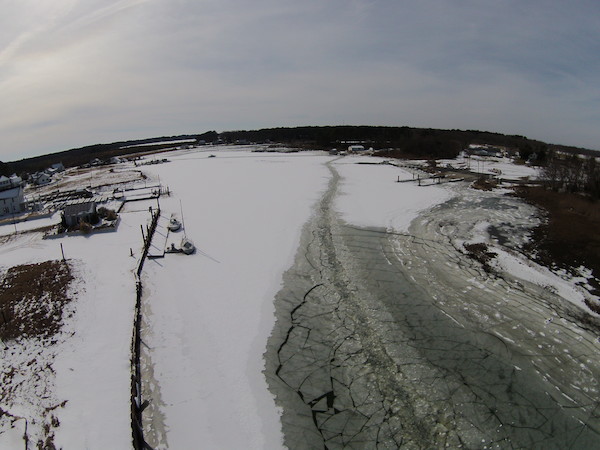PHOTOS
Oyster Harbor Frozen; Sock Monkey Unperturbed


Submissions to our FROZEN FOTOS this week come from Craig Richardson (top), who with the aid of his quadcopter unmanned aerial vehicle captured an iced-in Oyster harbor. Meanwhile, Ken Dufty reported that “Our sock monkey didn’t have to go to school today. He was so happy, he snuck out into the snow to take a ride on his snow horse. Never underestimate the joy that lives within a sock monkey.” (March 2, 2015)
BOARD OF SUPERVISORS
County Schools Hit by Shrinking Federal, State Aid
By WAYNE CREED
Cape Charles Wave
March 2, 2015
With more snow and colder temperatures looming, the Northampton Board of Supervisors met February 23 to conduct a joint meeting with the Northampton County School Board to discuss the FY 2016 Requested Budget. A joint meeting with the Planning Commission, along with the Town of Nassawaddox, was also conducted. At the forefront once again was the need to raise salaries for County teachers and staff. The School Board is looking for a 1.5% increase, on top of the step increase from last year. Superintendent Charlie Lawrence, pointed out that even as there was a 1.5% increase last year, the 1.5 % increase in healthcare completely wiped it out.
In all, of the $19.8 million the school board is requesting, over $8.5 million is to be funded locally. This is a $500,000 increase from last year. Lawrence pointed out that back in 2008-2009 the budget was $8.4 million, which adjusting for inflation would be $9.3 million today. “It just goes to show how far we have fallen behind,” he said.
Lawrence observed that “25 years is considered a generation. Twenty-two years ago, Northampton had high achieving schools. Fast forward and we now have just one school clinging to accreditation. I know it’s a lot of money and it won’t solve all our problems. The citizens of Northampton County deserve better or average schools. The students of Northampton, economically . . . we cannot afford to have average or better schools.
“During your last meeting, I was told that the morale of our teachers was low. That is just not true. Look, the men and woman of our county schools come to work each day and toil before and after school, doing all they can to move this division forward. Are they frustrated and feel that they need better working conditions? Yes. In the end, it is the taxpayers and children that deserve better schools,” he declared.
Even as Lawrence emphasized the need for the budget increase, he also spoke to important parts of the budget that would have to be dropped, like much needed repairs to schools (such as painting the bathrooms at Kiptopeke, which have never been painted), a teacher of alternative education, additional math and science teachers (even as we expect our children to compete globally on a technological scale, due to staffing constraints, we cannot offer a full year of science in 4th and 5th grade, and the math classrooms are still considered overcrowded).
From a Financial and Operations perspective, Director of Finance E. Brook Thomas offered an elegant presentation which provided a granular level insight into the issues and challenges of the operations budget. Of note, 65% of the budget goes to instruction, and breaking it down further, 78% goes toward salaries and benefits. This is critical because, as the Board looks to make cuts, “it is very difficult since you would be cutting people whose lives are dedicated to serving children,” Thomas said. [Read more…]
WAYNE CREED
Supervisors Missing Chance to Lower Flood Premiums
By WAYNE CREED
Cape Charles Wave
March 2, 2015
As the wonderful photography of Gertraud Fendler has documented, this winter has changed much of the Bay into a frozen pond. Despite the clean, white appearance, the actual condition of the water tells a different story. According to the Chesapeake Bay Foundation’s latest State of the Bay report (2014), the Bay is showing minor improvement, with Water quality indicator scores going up slightly. The problem with even this minor improvement is that the baseline has shifted so far towards the negative that incremental improvements such as this will hardly ever make a dent in the “real” health and quality of the Bay. The report also notes that Blue crabs and striped bass are showing signs of severe stress (due to pollution, diseases, overharvesting); again, these “metrics indicate a system still dangerously out of balance.” According to data from ChesapeakeBay.net, the abundance of spawning-age female blue crabs in the Chesapeake Bay decreased to 68.5 million in 2014, compared with 147 million in 2013.
Even as data continues to indicate an unhealthy Bay, and much of it pointing to the effects of human activity, it appears the Northampton County Planning Commission and Board of Supervisors are once again looking at removal of the Chesapeake Bay Protection Act from Seaside, using the rationale that it does not apply to the Seaside. This notion seems inconsistent with the original intent of the CBPA, which was envisioned to cover the Chesapeake Bay, its tributaries, and “other state waters.” According to the Virginia Department of Environmental Quality, the Bay Act program is designed to “improve water quality in the Chesapeake Bay and other waters of the State by requiring the use of effective land management and land use planning.” At the heart of the Bay Act is the concept that land can be used and developed to “minimize negative impacts on water quality.”
The first sentence of the Bay Act serves as a theme for the entire statute: “Healthy state and local economies and a healthy Chesapeake Bay are integrally related; balanced economic development and water quality protection are not mutually exclusive.”
The eloquent nature of the Bay Act is that it perceives that land should be used and developed to not just generate wealth for a few, but to minimize negative impacts on all water quality, which would benefit the majority of citizens (and even incubate economic development in the form of aquaculture and clean water tourism). In Virginia, the state designed the Bay Act to enhance water quality while at the same time allowing “reasonable development.” I guess this is the semantic argument, where a balancing act between state and local economic interests and water quality improvement is required. In Virginia the Bay Act puts the onus on local governments (who have the primary responsibility for land use decisions) to manage water quality, and “establishing a more specific relationship between water quality protection and local land use decision-making.” This quiet notion seems to be glaringly absent in the current proposed zoning. [Read more…]
FRIDAY 3/6: Donna Bozza on ‘How CBES Got its Groove Back’
Science and Philosophy Seminar of the Eastern Shore of Virginia will sponsor “How CBES Got Its Groove Back,” a free 90-minute seminar at 12:30 p.m. Friday, March 6, in the Lecture Hall of the Eastern Shore Community College, 29300 Lankford Hwy., Melfa. Donna Bozza will explore the journey of a grassroots organization, Citizens for a Better Eastern Shore, from its passionate conception to its commitment to community 27 years later. A former journalist and later director of the Eastern Shore Tourism Commission, Bozza is the first full-time director of CBES.
SUNDAY 3/8: Eastern Shore Orchestra at Hungar’s Church
The Orchestra of the Eastern Shore under the direction of Dr. Paul Kim presents “Songs for Spring” at Hungar’s Church in Bridgetown at 7:30 p.m. Program includes Mozart’s Exsultate, jubilate with soprano soloist Anna Sterrett, and Bach’s Cantata No. 56 (I Will Gladly Carry the Cross) with Matthew Scollin, bass-baritone and chorus. [Read more…]
TUESDAY 3/3: Shore Little League Registration
In-Person registration will be held at the Cape Charles Rescue Squad at 22215 S. Bayside Rd., Cheriton, on Tuesday, March 3, from 5:30-7:30 p.m.
In-Person registration will be held at Shore Little League on Thursday, March 5,from 5:30-7:30 p.m.
On-Line registration is available at http://Shorelittleleague.leaguetoolbox.com [Read more…]



















